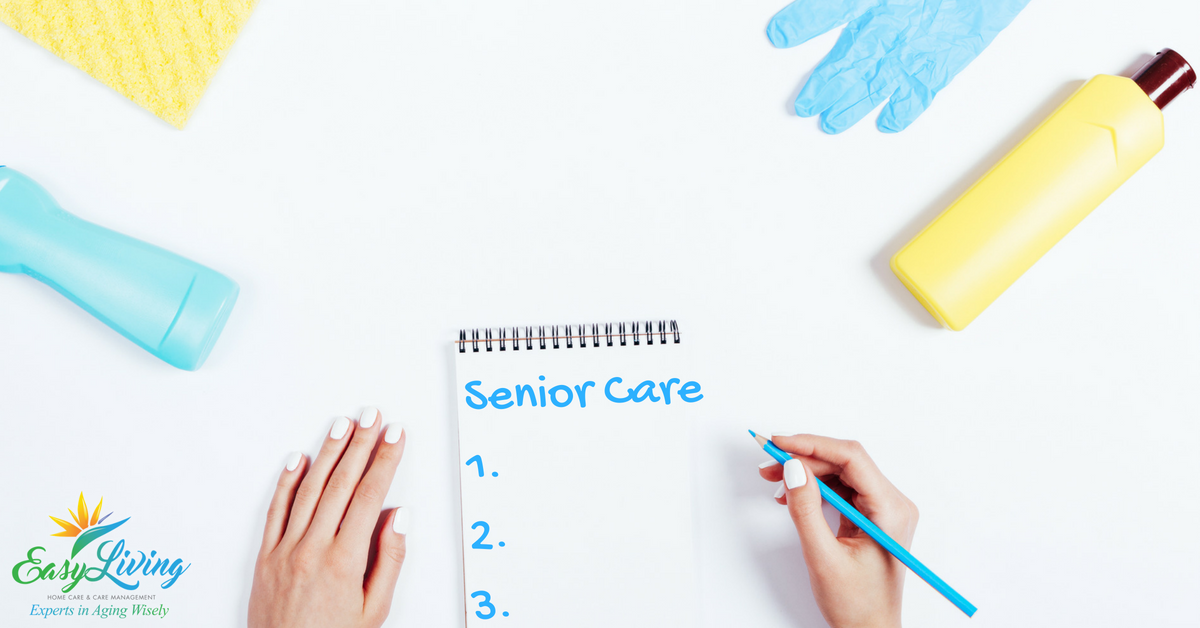When you’re going to have senior care in your home, there are just a few simple things you should do to prepare. A home is not a standard work environment, so it’s important to make sure it’s safe and set up in a way that the caregiver can do their best for you.
In 2015, almost 172,000 incidents of recordable injury or illness, or 6.8 incidents per 100 workers, occurred in the private nursing industry. This is one of the highest injury rates of all professions. Some of these incidents can be avoided with precautions. This includes worker training and supervision…but also taking steps to equip the home properly.
Consider typical expectations you’d have of any workplace. Unfortunately, because clients don’t think of their home in those terms the environment may be lacking. We’ll outline baseline considerations along with specific pointers so everyone has the best experience possible.
Pet Precautions for Senior Care Workers
You furry friends can be a workplace danger for senior care workers. Dog bites account for ⅓ of homeowner liability claims. And, more than 6,000 postal workers were attacked by dogs last year. Even if you have a calm, friendly dog they may be startled by someone new coming into your home. Additionally, your caregivers may be afraid of dogs or feel uncomfortable around an unfamiliar dog.
We ask all clients to safely lock dogs away when the caregiver is entering the home. It is also something your senior care agency should ask when doing their assessment and setting up care. We always want to make sure our caregivers are as safe as possible. It is our job to educate clients on safety considerations and policies. As a client, it’s a matter of respect for those helping you.
Tools for Senior Care: Supplies and Equipment
Caregivers will need some common supplies on any home care job. For example, antiseptic wipes, soap and gloves for infection control. These hygienic supplies keep you and your senior care workers healthy.
It’s also important that you have the needed supplies for your care and the care of your household. When you talk with the home care agency, we can advise you on what’s needed. We can also make arrangements for the caregiver to purchase items you need. Our supervisor’s intro. visit provides an opportunity to check on supplies and the household setup.
Sometimes you may need equipment to make providing your care safer and smoother. For example, a shower chair often helps with bathing. Again, our team can assess what’s needed and even help with securing such equipment. Simply reorganizing can also boost safety and convenience. We advise doing a tour in which you show the caregiver where things are. Take time to answer their questions and be open to suggestions.
Home Safety: Hygiene, Clutter, Etc.
Occasionally, we find a client whose home is in disrepair, extremely cluttered or unhygienic. We’ve been called out to hoarders’ homes and discovered rooms that aren’t navigable. Sometimes appliances aren’t in working order or there are fire hazards or structural damage. All of these issues must be addressed. Our senior care team can assist you and your family in this process. We’ve worked with hoarders and have various deep-cleaning and repair resources. If your loved one’s home is in poor condition, you might consider a care management assessment.
Your caregiver should be able to navigate through the home. He/she should be able to access supplies and find appliances and utilities in working order. The home should have a basic level of hygiene so you and the worker don’t risk illness or injury.
Basic Amenities
Similarly, it is reasonable for a senior care worker to expect basic amenities available while they’re working. These are nothing more than you’d expect anywhere you worked. Some examples include: access to a toilet with privacy, water to drink, tissues, etc. You may be surprised to learn we’ve had clients who didn’t want the caregiver using the home’s bathroom. Or, they’ve asked the worker to bring their own water or not have a cup of coffee. Caregivers should also have some place to sit and take a break occasionally.
You aren’t expected to provide luxuries or go out of your way. But, it should be a comfortable environment for someone working hard to help you. Clients sometimes hesitate to hire senior care because they think they’ll have to constantly provide instruction or conversation. If the agency provides a thorough care plan, you shouldn’t have to. And, if you’re open about what you want, the agency can find the right match and guide the person. If something isn’t going well or you aren’t sure of the proper way to handle an issue, contact the agency. We always prefer to hear about concerns and answer questions. And caregivers appreciate the feedback too.
Temperature
An issue that comes up occasionally is the temperature of the home. Older people tend to have a lower body temperature or may not be as sensitive to heat/cold. Or, they may want to save money on utility bills. While we understand this, the senior care worker also needs a reasonable environment to do physical labor. Our team can gladly provide some guidelines and figure out solutions. For example, if you feel it’s too cold, it may be as simple as providing a fan in the kitchen for the caregiver or closing a vent that blows on you.

